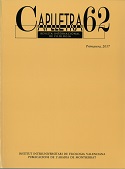Ephemeral stories: plausible example and dialogue in the «Llibre de meravelles»
DOI:
https://doi.org/10.7203/caplletra.62.9573Keywords:
literatura catalana, literatura medieval, Ramon Llull, Llibre de meravelles, ejemplo verosímil, cuento, diálogo, experimentación narrativa Abstract
Abstract
Abstract: The Llibre de meravelles (Felix or the Book of Wonders) by Ramon Llull includes an extensive collection of plausible stories, used by the characters to show their views about the world or to express their position in the debate. The stories are created ad hoc by the author and their life begins and ends with that single enunciation within the novel. That fleeting, ephemeral condition occasionally gives them the appearance of mere narrative hypothesis. Some of these stories even seem to have a provisional or unstable plot which emphasizes their illusory nature. The writing of the book reveals an enormous effort of experimentation, visible not only in the design of the stories, but also in the «dialogue» that is established among them. This desire for experimentation is finally projected onto the reader, as the text truly becomes a guide for inventing new stories. That meta-exemplary dimension is the clearest sign of originality of Llull’s proposal in the scene of Medieval Exemplary Literature.
Key words: Catalan Literature, Medieval Literature, Ramon Llull, Felix or the Book of Wonders, Plausible example, Story, Dialogue, Narrative Experimentation.
 Downloads
Downloads
Downloads
Published
How to Cite
-
Abstract898
-
PDF (Català)630
Issue
Section
License
Authors submitting work to Caplletra for publication must be the legitimate holder of the usage rights. Legitimacy for the purposes of publishing the work must also include images, tables, diagrams and any other materials that may complement the text, whether they are the author of such material or not.
Copyright: on publishing their work in the journal, the author grants Caplletra. Revista Internacional de Filologia usage rights (reproduction, distribution and public communication) for both the paper printed version and for the electronic version.
All work published in Caplletra is covered by the Creative Commons license type Attribution-NonCommercial-NoDerivatives 4.0 (CC BY-NC-ND 4.0).
RESPONSABILITY
Caplletra. Revista Internacional de Filologia does not necessarily identify with the points of view expressed in the papers it publishes.
Caplletra. Revista Internacional de Filologia accepts no responsibility whatsoever for any eventual infringement of intellectual property rights on the part of authors.






